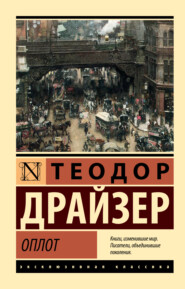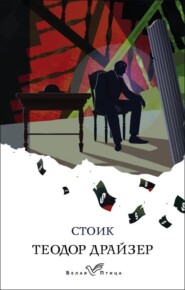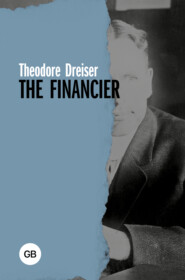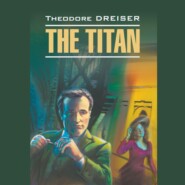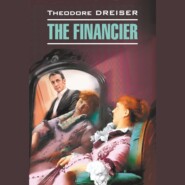По всем вопросам обращайтесь на: info@litportal.ru
(©) 2003-2025.
✖
The Titan / Титан
Настройки чтения
Размер шрифта
Высота строк
Поля
Then came the dress from Donovan's, rustling and crisping. She slipped into it wonderingly, critically, while Fadette worked at the back, the arms, about her knees, doing one little essential thing after another.
“Oh, Madame!” she exclaimed. “Oh, charmant! Ze hair, it go weeth it perfect. It ees so full, so beyutiful here” – she pointed to the hips, where the lace formed a clinging basque. “Oh, tees varee, varee nize.”
Aileen glowed, but with scarcely a smile. She was concerned. It wasn't so much her toilet, which must be everything that it should be – but this Mr. Addison, who was so rich and in society, and Mr. Rambaud, who was very powerful, Frank said, must like her. It was the necessity to put her best foot forward now that was really troubling her. She must interest these men mentally, perhaps, as well as physically, and with social graces, and that was not so easy. For all her money and comfort in Philadelphia she had never been in society in its best aspects, had never done social entertaining of any real importance. Frank was the most important man who had ever crossed her path. No doubt Mr. Rambaud had a severe, old-fashioned wife. How would she talk to her? And Mrs. Addison! She would know and see everything. Aileen almost talked out loud to herself in a consoling way as she dressed, so strenuous were her thoughts; but she went on, adding the last touches to her physical graces.
When she finally went down-stairs to see how the dining and reception rooms looked, and Fadette began putting away the welter of discarded garments – she was a radiant vision – a splendid greenish-gold figure, with gorgeous hair, smooth, soft, shapely ivory arms, a splendid neck and bust, and a swelling form. She felt beautiful, and yet she was a little nervous – truly. Frank himself would be critical. She went about looking into the dining-room, which, by the caterer's art, had been transformed into a kind of jewel-box glowing with flowers, silver, gold, tinted glass, and the snowy whiteness of linen. It reminded her of an opal flashing all its soft fires. She went into the general reception-room, where was a grand piano finished in pink and gold, upon which, with due thought to her one accomplishment – her playing – she had arranged the songs and instrumental pieces she did best. Aileen was really not a brilliant musician. For the first time in her life she felt matronly – as if now she were not a girl any more, but a woman grown, with some serious responsibilities, and yet she was not really suited to the role. As a matter of fact, her thoughts were always fixed on the artistic, social, and dramatic aspects of life, with unfortunately a kind of nebulosity of conception which permitted no condensation into anything definite or concrete. She could only be wildly and feverishly interested. Just then the door clicked to Frank's key – it was nearing six – and in he came, smiling, confident, a perfect atmosphere of assurance.
“Well!” he observed, surveying her in the soft glow of the reception-room lighted by wall candles judiciously arranged. “Who's the vision floating around here? I'm almost afraid to touch you. Much powder on those arms?”
He drew her into his arms, and she put up her mouth with a sense of relief. Obviously, he must think that she looked charming.
“I am chalky, I guess. You'll just have to stand it, though. You're going to dress, anyhow.”
She put her smooth, plump arms about his neck, and he felt pleased. This was the kind of a woman to have – a beauty. Her neck was resplendent with a string of turquoise, her fingers too heavily jeweled, but still beautiful. She was faintly redolent of hyacinth or lavender. Her hair appealed to him, and, above all, the rich yellow silk of her dress, flashing fulgurously through the closely netted green.
“Charming, girlie. You've outdone yourself. I haven't seen this dress before. Where did you get it?”
“Here in Chicago.”
He lifted her warm fingers, surveying her train, and turned her about.
“You don't need any advice. You ought to start a school.”
“Am I all right?” she queried, smartly, but with a sense of self-distrust for the moment, and all because of him.
“You're perfect. Couldn't be nicer. Splendid!”
She took heart.
“I wish your friends would think so. You'd better hurry.”
He went up-stairs, and she followed, looking first into the dining-room again. At least that was right. Surely Frank was a master.
At seven the plop of the feet of carriage-horses was heard, and a moment later Louis, the butler, was opening the door. Aileen went down, a little nervous, a little frigid, trying to think of many pleasant things, and wondering whether she would really succeed in being entertaining. Cowperwood accompanied her, a very different person in so far as mood and self-poise were concerned. To himself his own future was always secure, and that of Aileen's if he wished to make it so. The arduous, upward-ascending rungs of the social ladder that were troubling her had no such significance to him.
The dinner, as such simple things go, was a success from what might be called a managerial and pictorial point of view. Cowperwood, because of his varied tastes and interests, could discuss railroading with Mr. Rambaud in a very definite and illuminating way; could talk architecture with Mr. Lord as a student, for instance, of rare promise would talk with a master; and with a woman like Mrs. Addison or Mrs. Rambaud he could suggest or follow appropriate leads. Aileen, unfortunately, was not so much at home, for her natural state and mood were remote not so much from a serious as from an accurate conception of life. So many things, except in a very nebulous and suggestive way, were sealed books to Aileen – merely faint, distant tinklings. She knew nothing of literature except certain authors who to the truly cultured might seem banal. As for art, it was merely a jingle of names gathered from Cowperwood's private comments. Her one redeeming feature was that she was truly beautiful herself – a radiant, vibrating objet d'art. A man like Rambaud, remote, conservative, constructive, saw the place of a woman like Aileen in the life of a man like Cowperwood on the instant. She was such a woman as he would have prized himself in a certain capacity.
Sex interest in all emphasis men usually endures unto the end, governed sometimes by a stoic resignation. The experiment of such attraction can, as they well know, be made over and over, but to what end? For many it becomes too troublesome. Yet the presence of so glittering a spectacle as Aileen on this night touched Mr. Rambaud with an ancient ambition. He looked at her almost sadly. Once he was much younger. But alas, he had never attracted the flaming interest of any such woman. As he studied her now he wished that he might have enjoyed such good fortune.
In contrast with Aileen's orchid glow and tinted richness Mrs. Rambaud's simple gray silk, the collar of which came almost to her ears, was disturbing – almost reproving – but Mrs. Rambaud's ladylike courtesy and generosity made everything all right. She came out of intellectual New England – the Emerson-Thoreau-Channing Phillips school of philosophy – and was broadly tolerant. As a matter of fact, she liked Aileen and all the Orient richness she represented. “Such a sweet little house this is,” she said, smilingly. “We've noticed it often. We're not so far removed from you but what we might be called neighbors.”
Aileen's eyes spoke appreciation. Although she could not fully grasp Mrs. Rambaud, she understood her, in a way, and liked her. She was probably something like her own mother would have been if the latter had been highly educated. While they were moving into the reception-room Taylor Lord was announced. Cowperwood took his hand and brought him forward to the others.
“Mrs. Cowperwood,” said Lord, admiringly – a tall, rugged, thoughtful person – “let me be one of many to welcome you to Chicago. After Philadelphia you will find some things to desire at first, but we all come to like it eventually.”
“Oh, I'm sure I shall,” smiled Aileen.
“I lived in Philadelphia years ago, but only for a little while,” added Lord. “I left there to come here.”
The observation gave Aileen the least pause, but she passed it over lightly. This sort of accidental reference she must learn to expect; there might be much worse bridges to cross.
“I find Chicago all right,” she replied, briskly. “There's nothing the matter with it. It has more snap than Philadelphia ever had.”
“I'm glad to hear you say that. I like it so much. Perhaps it's because I find such interesting things to do here.”
He was admiring the splendor of her arms and hair. What need had beautiful woman to be intellectual, anyhow, he was saying to himself, sensing that Aileen might be deficient in ultimate refinement.
Once more an announcement from the butler, and now Mr. and Mrs. Addison entered. Addison was not at all concerned over coming here – liked the idea of it; his own position and that of his wife in Chicago was secure. “How are you, Cowperwood?” he beamed, laying one hand on the latter's shoulder. “This is fine of you to have us in to-night. Mrs. Cowperwood, I've been telling your husband for nearly a year now that he should bring you out here. Did he tell you?” (Addison had not as yet confided to his wife the true history of Cowperwood and Aileen.)
“Yes, indeed,” replied Aileen, gaily, feeling that Addison was charmed by her beauty. “I've been wanting to come, too. It's his fault that I wasn't here sooner.”
Addison, looking circumspectly at Aileen, said to himself that she was certainly a stunning-looking woman. So she was the cause of the first wife's suit. No wonder. What a splendid creature! He contrasted her with Mrs. Addison, and to his wife's disadvantage. She had never been as striking, as stand-upish as Aileen, though possibly she might have more sense. Jove! if he could find a woman like Aileen to-day. Life would take on a new luster. And yet he had women – very carefully, very subterraneously. But he had them.
“It's such a pleasure to meet you,” Mrs. Addison, a corpulent, bejeweled lady, was saying to Aileen. “My husband and yours have become the best of friends, apparently. We must see more of each other.”
She babbled on in a puffy social way, and Aileen felt as though she were getting along swiftly. The butler brought in a great tray of appetizers and cordials, and put them softly on a remote table. Dinner was served, and the talk flowed on; they discussed the growth of the city, a new church that Lord was building ten blocks farther out; Rambaud told about some humorous land swindles. It was quite gay. Meanwhile Aileen did her best to become interested in Mrs. Rambaud and Mrs. Addison. She liked the latter somewhat better, solely because it was a little easier to talk to her. Mrs. Rambaud Aileen knew to be the wiser and more charitable woman, but she frightened her a little; presently she had to fall back on Mr. Lord's help. He came to her rescue gallantly, talking of everything that came into his mind. All the men outside of Cowperwood were thinking how splendid Aileen was physically, how white were her arms, how rounded her neck and shoulders, how rich her hair.
Chapter VII
Chicago Gas
Old Peter Laughlin, rejuvenated by Cowperwood's electric ideas, was making money for the house. He brought many bits of interesting gossip from the floor, and such shrewd guesses as to what certain groups and individuals were up to, that Cowperwood was able to make some very brilliant deductions.
“By Gosh! Frank, I think I know exactly what them fellers are trying to do,” Laughlin would frequently remark of a morning, after he had lain in his lonely Harrison Street bed meditating the major portion of the night. “That there Stock Yards gang” (and by gang he meant most of the great manipulators, like Arneel, Hand, Schryhart and others) “are after corn again. We want to git long o' that now, or I miss my guess. What do you think, huh?”
Cowperwood, schooled by now in many Western subtleties which he had not previously known, and daily becoming wiser, would as a rule give an instantaneous decision.
“You're right. Risk a hundred thousand bushels. I think New York Central is going to drop a point or two in a few days. We'd better go short a point.”
Laughlin could never figure out quite how it was that Cowperwood always seemed to know and was ready to act quite as quickly in local matters as he was himself. He understood his wisdom concerning Eastern shares and things dealt in on the Eastern exchange, but these Chicago matters?
“Whut makes you think that?” he asked Cowperwood, one day, quite curiously.
“Why, Peter,” Cowperwood replied, quite simply, “Anton Videra” (one of the directors of the Wheat and Corn Bank) “was in here yesterday while you were on 'change, and he was telling me.” He described a situation which Videra had outlined.
Laughlin knew Videra as a emphasis, wealthy Pole who had come up in the last few years. It was strange how Cowperwood naturally got in with these wealthy men and won their confidence so quickly. Videra would never have become so confidential with him.
“Huh!” he exclaimed. “Well, if he says it it's more'n likely so.”
So Laughlin bought, and Peter Laughlin & Co. won.
But this grain and commission business, while it was yielding a profit which would average about twenty thousand a year to each partner, was nothing more to Cowperwood than a source of information.
He wanted to “get in” on something that was sure to bring very great returns within a reasonable time and that would not leave him in any such desperate situation as he was at the time of the Chicago fire – spread out very thin, as he put it. He had interested in his ventures a small group of Chicago men who were watching him – Judah Addison, Alexander Rambaud, Millard Bailey, Anton Videra – men who, although not supreme figures by any means, had free capital. He knew that he could go to them with any truly sound proposition. The one thing that most attracted his attention was the Chicago gas situation, because there was a chance to step in almost unheralded in an as yet unoccupied territory; with franchises once secured – the reader can quite imagine how – he could present himself, like a Hamilcar Barca in the heart of Spain or a Hannibal at the gates of Rome, with a demand for surrender and a division of spoils.
There were at this time three gas companies operating in the three different divisions of the city – the three sections, or “sides,” as they were called – South, West, and North, and of these the Chicago Gas, Light, and Coke Company, organized in 1848 to do business on the South Side, was the most flourishing and important. The People's Gas, Light, and Coke Company, doing business on the West Side, was a few years younger than the South Chicago company, and had been allowed to spring into existence through the foolish self-confidence of the organizer and directors of the South Side company, who had fancied that neither the West Side nor the North Side was going to develop very rapidly for a number of years to come, and had counted on the city council's allowing them to extend their mains at any time to these other portions of the city. A third company, the North Chicago Gas Illuminating Company, had been organized almost simultaneously with the West Side company by the same process through which the other companies had been brought into life – their avowed intention, like that of the West Side company, being to confine their activities to the sections from which the organizers presumably came.
Cowperwood's first project was to buy out and combine the three old city companies. With this in view he looked up the holders in all three corporations – their financial and social status. It was his idea that by offering them three for one, or even four for one, for every dollar represented by the market value of their stock he might buy in and capitalize the three companies as one. Then, by issuing sufficient stock to cover all his obligations, he would reap a rich harvest and at the same time leave himself in charge. He approached Judah Addison first as the most available man to help float a scheme of this kind. He did not want him as a partner so much as he wanted him as an investor.
“Oh, Madame!” she exclaimed. “Oh, charmant! Ze hair, it go weeth it perfect. It ees so full, so beyutiful here” – she pointed to the hips, where the lace formed a clinging basque. “Oh, tees varee, varee nize.”
Aileen glowed, but with scarcely a smile. She was concerned. It wasn't so much her toilet, which must be everything that it should be – but this Mr. Addison, who was so rich and in society, and Mr. Rambaud, who was very powerful, Frank said, must like her. It was the necessity to put her best foot forward now that was really troubling her. She must interest these men mentally, perhaps, as well as physically, and with social graces, and that was not so easy. For all her money and comfort in Philadelphia she had never been in society in its best aspects, had never done social entertaining of any real importance. Frank was the most important man who had ever crossed her path. No doubt Mr. Rambaud had a severe, old-fashioned wife. How would she talk to her? And Mrs. Addison! She would know and see everything. Aileen almost talked out loud to herself in a consoling way as she dressed, so strenuous were her thoughts; but she went on, adding the last touches to her physical graces.
When she finally went down-stairs to see how the dining and reception rooms looked, and Fadette began putting away the welter of discarded garments – she was a radiant vision – a splendid greenish-gold figure, with gorgeous hair, smooth, soft, shapely ivory arms, a splendid neck and bust, and a swelling form. She felt beautiful, and yet she was a little nervous – truly. Frank himself would be critical. She went about looking into the dining-room, which, by the caterer's art, had been transformed into a kind of jewel-box glowing with flowers, silver, gold, tinted glass, and the snowy whiteness of linen. It reminded her of an opal flashing all its soft fires. She went into the general reception-room, where was a grand piano finished in pink and gold, upon which, with due thought to her one accomplishment – her playing – she had arranged the songs and instrumental pieces she did best. Aileen was really not a brilliant musician. For the first time in her life she felt matronly – as if now she were not a girl any more, but a woman grown, with some serious responsibilities, and yet she was not really suited to the role. As a matter of fact, her thoughts were always fixed on the artistic, social, and dramatic aspects of life, with unfortunately a kind of nebulosity of conception which permitted no condensation into anything definite or concrete. She could only be wildly and feverishly interested. Just then the door clicked to Frank's key – it was nearing six – and in he came, smiling, confident, a perfect atmosphere of assurance.
“Well!” he observed, surveying her in the soft glow of the reception-room lighted by wall candles judiciously arranged. “Who's the vision floating around here? I'm almost afraid to touch you. Much powder on those arms?”
He drew her into his arms, and she put up her mouth with a sense of relief. Obviously, he must think that she looked charming.
“I am chalky, I guess. You'll just have to stand it, though. You're going to dress, anyhow.”
She put her smooth, plump arms about his neck, and he felt pleased. This was the kind of a woman to have – a beauty. Her neck was resplendent with a string of turquoise, her fingers too heavily jeweled, but still beautiful. She was faintly redolent of hyacinth or lavender. Her hair appealed to him, and, above all, the rich yellow silk of her dress, flashing fulgurously through the closely netted green.
“Charming, girlie. You've outdone yourself. I haven't seen this dress before. Where did you get it?”
“Here in Chicago.”
He lifted her warm fingers, surveying her train, and turned her about.
“You don't need any advice. You ought to start a school.”
“Am I all right?” she queried, smartly, but with a sense of self-distrust for the moment, and all because of him.
“You're perfect. Couldn't be nicer. Splendid!”
She took heart.
“I wish your friends would think so. You'd better hurry.”
He went up-stairs, and she followed, looking first into the dining-room again. At least that was right. Surely Frank was a master.
At seven the plop of the feet of carriage-horses was heard, and a moment later Louis, the butler, was opening the door. Aileen went down, a little nervous, a little frigid, trying to think of many pleasant things, and wondering whether she would really succeed in being entertaining. Cowperwood accompanied her, a very different person in so far as mood and self-poise were concerned. To himself his own future was always secure, and that of Aileen's if he wished to make it so. The arduous, upward-ascending rungs of the social ladder that were troubling her had no such significance to him.
The dinner, as such simple things go, was a success from what might be called a managerial and pictorial point of view. Cowperwood, because of his varied tastes and interests, could discuss railroading with Mr. Rambaud in a very definite and illuminating way; could talk architecture with Mr. Lord as a student, for instance, of rare promise would talk with a master; and with a woman like Mrs. Addison or Mrs. Rambaud he could suggest or follow appropriate leads. Aileen, unfortunately, was not so much at home, for her natural state and mood were remote not so much from a serious as from an accurate conception of life. So many things, except in a very nebulous and suggestive way, were sealed books to Aileen – merely faint, distant tinklings. She knew nothing of literature except certain authors who to the truly cultured might seem banal. As for art, it was merely a jingle of names gathered from Cowperwood's private comments. Her one redeeming feature was that she was truly beautiful herself – a radiant, vibrating objet d'art. A man like Rambaud, remote, conservative, constructive, saw the place of a woman like Aileen in the life of a man like Cowperwood on the instant. She was such a woman as he would have prized himself in a certain capacity.
Sex interest in all emphasis men usually endures unto the end, governed sometimes by a stoic resignation. The experiment of such attraction can, as they well know, be made over and over, but to what end? For many it becomes too troublesome. Yet the presence of so glittering a spectacle as Aileen on this night touched Mr. Rambaud with an ancient ambition. He looked at her almost sadly. Once he was much younger. But alas, he had never attracted the flaming interest of any such woman. As he studied her now he wished that he might have enjoyed such good fortune.
In contrast with Aileen's orchid glow and tinted richness Mrs. Rambaud's simple gray silk, the collar of which came almost to her ears, was disturbing – almost reproving – but Mrs. Rambaud's ladylike courtesy and generosity made everything all right. She came out of intellectual New England – the Emerson-Thoreau-Channing Phillips school of philosophy – and was broadly tolerant. As a matter of fact, she liked Aileen and all the Orient richness she represented. “Such a sweet little house this is,” she said, smilingly. “We've noticed it often. We're not so far removed from you but what we might be called neighbors.”
Aileen's eyes spoke appreciation. Although she could not fully grasp Mrs. Rambaud, she understood her, in a way, and liked her. She was probably something like her own mother would have been if the latter had been highly educated. While they were moving into the reception-room Taylor Lord was announced. Cowperwood took his hand and brought him forward to the others.
“Mrs. Cowperwood,” said Lord, admiringly – a tall, rugged, thoughtful person – “let me be one of many to welcome you to Chicago. After Philadelphia you will find some things to desire at first, but we all come to like it eventually.”
“Oh, I'm sure I shall,” smiled Aileen.
“I lived in Philadelphia years ago, but only for a little while,” added Lord. “I left there to come here.”
The observation gave Aileen the least pause, but she passed it over lightly. This sort of accidental reference she must learn to expect; there might be much worse bridges to cross.
“I find Chicago all right,” she replied, briskly. “There's nothing the matter with it. It has more snap than Philadelphia ever had.”
“I'm glad to hear you say that. I like it so much. Perhaps it's because I find such interesting things to do here.”
He was admiring the splendor of her arms and hair. What need had beautiful woman to be intellectual, anyhow, he was saying to himself, sensing that Aileen might be deficient in ultimate refinement.
Once more an announcement from the butler, and now Mr. and Mrs. Addison entered. Addison was not at all concerned over coming here – liked the idea of it; his own position and that of his wife in Chicago was secure. “How are you, Cowperwood?” he beamed, laying one hand on the latter's shoulder. “This is fine of you to have us in to-night. Mrs. Cowperwood, I've been telling your husband for nearly a year now that he should bring you out here. Did he tell you?” (Addison had not as yet confided to his wife the true history of Cowperwood and Aileen.)
“Yes, indeed,” replied Aileen, gaily, feeling that Addison was charmed by her beauty. “I've been wanting to come, too. It's his fault that I wasn't here sooner.”
Addison, looking circumspectly at Aileen, said to himself that she was certainly a stunning-looking woman. So she was the cause of the first wife's suit. No wonder. What a splendid creature! He contrasted her with Mrs. Addison, and to his wife's disadvantage. She had never been as striking, as stand-upish as Aileen, though possibly she might have more sense. Jove! if he could find a woman like Aileen to-day. Life would take on a new luster. And yet he had women – very carefully, very subterraneously. But he had them.
“It's such a pleasure to meet you,” Mrs. Addison, a corpulent, bejeweled lady, was saying to Aileen. “My husband and yours have become the best of friends, apparently. We must see more of each other.”
She babbled on in a puffy social way, and Aileen felt as though she were getting along swiftly. The butler brought in a great tray of appetizers and cordials, and put them softly on a remote table. Dinner was served, and the talk flowed on; they discussed the growth of the city, a new church that Lord was building ten blocks farther out; Rambaud told about some humorous land swindles. It was quite gay. Meanwhile Aileen did her best to become interested in Mrs. Rambaud and Mrs. Addison. She liked the latter somewhat better, solely because it was a little easier to talk to her. Mrs. Rambaud Aileen knew to be the wiser and more charitable woman, but she frightened her a little; presently she had to fall back on Mr. Lord's help. He came to her rescue gallantly, talking of everything that came into his mind. All the men outside of Cowperwood were thinking how splendid Aileen was physically, how white were her arms, how rounded her neck and shoulders, how rich her hair.
Chapter VII
Chicago Gas
Old Peter Laughlin, rejuvenated by Cowperwood's electric ideas, was making money for the house. He brought many bits of interesting gossip from the floor, and such shrewd guesses as to what certain groups and individuals were up to, that Cowperwood was able to make some very brilliant deductions.
“By Gosh! Frank, I think I know exactly what them fellers are trying to do,” Laughlin would frequently remark of a morning, after he had lain in his lonely Harrison Street bed meditating the major portion of the night. “That there Stock Yards gang” (and by gang he meant most of the great manipulators, like Arneel, Hand, Schryhart and others) “are after corn again. We want to git long o' that now, or I miss my guess. What do you think, huh?”
Cowperwood, schooled by now in many Western subtleties which he had not previously known, and daily becoming wiser, would as a rule give an instantaneous decision.
“You're right. Risk a hundred thousand bushels. I think New York Central is going to drop a point or two in a few days. We'd better go short a point.”
Laughlin could never figure out quite how it was that Cowperwood always seemed to know and was ready to act quite as quickly in local matters as he was himself. He understood his wisdom concerning Eastern shares and things dealt in on the Eastern exchange, but these Chicago matters?
“Whut makes you think that?” he asked Cowperwood, one day, quite curiously.
“Why, Peter,” Cowperwood replied, quite simply, “Anton Videra” (one of the directors of the Wheat and Corn Bank) “was in here yesterday while you were on 'change, and he was telling me.” He described a situation which Videra had outlined.
Laughlin knew Videra as a emphasis, wealthy Pole who had come up in the last few years. It was strange how Cowperwood naturally got in with these wealthy men and won their confidence so quickly. Videra would never have become so confidential with him.
“Huh!” he exclaimed. “Well, if he says it it's more'n likely so.”
So Laughlin bought, and Peter Laughlin & Co. won.
But this grain and commission business, while it was yielding a profit which would average about twenty thousand a year to each partner, was nothing more to Cowperwood than a source of information.
He wanted to “get in” on something that was sure to bring very great returns within a reasonable time and that would not leave him in any such desperate situation as he was at the time of the Chicago fire – spread out very thin, as he put it. He had interested in his ventures a small group of Chicago men who were watching him – Judah Addison, Alexander Rambaud, Millard Bailey, Anton Videra – men who, although not supreme figures by any means, had free capital. He knew that he could go to them with any truly sound proposition. The one thing that most attracted his attention was the Chicago gas situation, because there was a chance to step in almost unheralded in an as yet unoccupied territory; with franchises once secured – the reader can quite imagine how – he could present himself, like a Hamilcar Barca in the heart of Spain or a Hannibal at the gates of Rome, with a demand for surrender and a division of spoils.
There were at this time three gas companies operating in the three different divisions of the city – the three sections, or “sides,” as they were called – South, West, and North, and of these the Chicago Gas, Light, and Coke Company, organized in 1848 to do business on the South Side, was the most flourishing and important. The People's Gas, Light, and Coke Company, doing business on the West Side, was a few years younger than the South Chicago company, and had been allowed to spring into existence through the foolish self-confidence of the organizer and directors of the South Side company, who had fancied that neither the West Side nor the North Side was going to develop very rapidly for a number of years to come, and had counted on the city council's allowing them to extend their mains at any time to these other portions of the city. A third company, the North Chicago Gas Illuminating Company, had been organized almost simultaneously with the West Side company by the same process through which the other companies had been brought into life – their avowed intention, like that of the West Side company, being to confine their activities to the sections from which the organizers presumably came.
Cowperwood's first project was to buy out and combine the three old city companies. With this in view he looked up the holders in all three corporations – their financial and social status. It was his idea that by offering them three for one, or even four for one, for every dollar represented by the market value of their stock he might buy in and capitalize the three companies as one. Then, by issuing sufficient stock to cover all his obligations, he would reap a rich harvest and at the same time leave himself in charge. He approached Judah Addison first as the most available man to help float a scheme of this kind. He did not want him as a partner so much as he wanted him as an investor.







